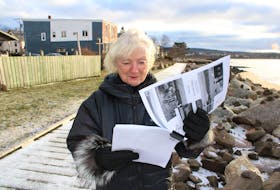. It is in his mother Angie’s head and it is synched with the $8,000 insulin pump Nicolas wears day and night.
“We are constantly matching insulin to carbohydrate and exercise, always, always, always,” said Angie VanKessel.
At two years of age, Nicholas was diagnosed with juvenile or Type 1 diabetes. It means his pancreas no longer produces the insulin required to sustain life. Thanks to the pioneering work of Canadian scientist Dr. Frederick Banting and his colleagues, insulin can be provided artificially, exclusively by injection in the early years and more recently, by injection or insulin pump.
“People tell me great strides in treatment and research have been made in recent years but as yet there is no cure so we’re working on that,” said VanKessel.
The Juvenile Diabetes Research Foundation will host a fundraising walk in Truro’s Victoria Park Saturday to continue the search for a cure.
“I’m confident it will come in Nicolas’ lifetime but I’m equally hopeful a way to prevent Type 1 will be found. It would make me so happy to know no other child will have to deal with this.”
VanKessel is a horticulturalist and her husband, Mike, is a farmer turned mechanic.
‘Nicholas’ diagnosis came at a time when we thought we were already stressed. Mike had gone back to school so that had a big impact on our income. We’d just had our second child and soon after I had to have surgery. I had just reached the end of my recovery period when Nicholas was diagnosed.”
It is never easy to hear a child has a disease for which there is no cure but the VanKessels were grateful their son had something that could be managed.
“When we came home from hospital after diagnosis we were terrified. We’d gotten a few hours of training in hospital and now it was up to us to keep Nicholas alive. It didn’t matter if we felt comfortable giving injections because he had to have them.”
Over time the family learned to deal with Nicholas’ diabetes one day at a time.
“We quickly figured out that as worried as we might be, he was a little boy who wanted to do everything that looked like fun to him. We couldn’t stop him so we had to figure out how he could do all these things without too much fluctuation in his blood sugars.”
Management got a bit easier when Nicholas got an insulin pump before starting school.
“It is a very expensive piece of equipment but it allows us to respond quickly to high or low blood sugars so it is safer. We can adjust his insulin if we know he is going to have a very active day or a birthday party, for example.”
At the same time, they learned to deal with a lack of understanding about Type 1 diabetes.
“I really don’t like people saying he can’t do things because he had diabetes. He can do anything but we have to figure out how to do it.”
VanKessel would also like people to know her son’s condition has nothing to do with his sugar consumption.
‘We grow our own meat and vegetables and we’re an active family so this not a result of poor diet or lack of exercise. Nicholas did not get diabetes because he ate too much sugar. In fact, he’d barely tasted sugar before he was diagnosed.”
She has to remind herself people who are uninformed generally mean well.
“I didn’t know much about diabetes before I was thrown into it. I am always grateful for the people who are willing to hear us out and work with us. Nicholas’ school (Frank H. MacDonald), for example, has not had a child with Type 1 in years but they have been great.”
These days VanKessel is a support and advocate for other families grappling with Type 1 care.
“Having been there, I know the shock of it so I can offer emotional support. Over the years I’ve also learned a lot of practical things that can make life a little easier. We are very sharing within the diabetes community.”
Her family attends an annual camp for families with diabetes and it is a highlight of their year.
“It hurts to see so many little kids with diabetes but it is great for Nicholas to be among people where sugar-testing is the norm and not just something he has to do. We’ve found great support and made really good friendships through these camps.”
It frustrates VanKessel that sometimes the level of care a child gets depends on a family’s finances.
“It is a very expensive disease, in terms of equipment and supplies. For a family without insurance coverage it can be devastating,” she said, noting each blood test strip costs approximately one dollar and a child can require a dozen or more in a single day.”
It can also affect a family’s ability to earn income, she pointed out.
“Many people with a Type 1 child are constantly on call so cannot work fulltime. If I take a horticultural job, the first thing I have to say is that I may have to leave at a moment’s notice if my son needs me.”
Bright and curious, Nicholas keeps his sister, Caroline, on her toes and loves gymnastics, skating, swimming and nothing beats getting dirty on the farm. That is what the VanKessels focus on when they get up every morning at 3 a.m. to check his sugar.








